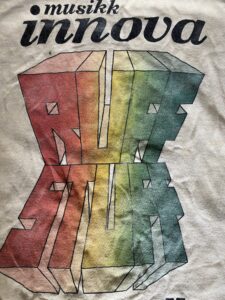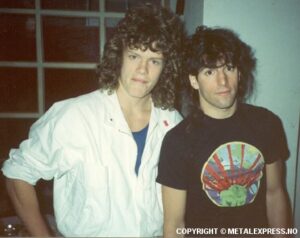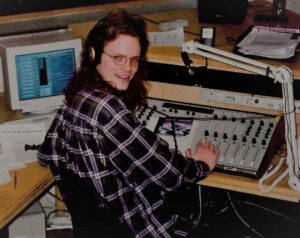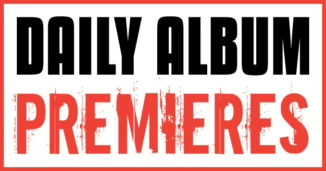
This chapter is part of a book called Tales from a Metalhead written by Metal Express Radio’s President Stig G. Nordahl. The chapters will be posted one at the time and you can find them all here.
I was doing Hard Rock shows on FM radio for about 15 years before going online. Even though I did various shows on air in the coming years they all had one thing in common; me playing Hard Rock and Heavy Metal on the air. This is where Metal Express Radio started, albeit under various names until I settled on the name Metal Express in 1992, and added “Radio” to the name in 2000.
Taking Metal Express Radio to the World Wide Web in the year 2000 was a game changer. All of a sudden we were a radio station streaming music 24/7 with listeners all over the world. This opened the door to interact with Metal fans in all corners of the world, first via email and later in social media.

FM radio definitely had its charm though and sometimes I miss it. In the 80s the shows were always live which gave it a different feel. When I had competitions on the air, the listeners had to send their answers via regular mail and wait one week to tune in and wait for the announcement of the winners. The exception was when I ran longer shows during night time on the weekends. Then listeners could call in with their answers. Letters were the only feedback I got from the listeners back then. On occasions, I still run into people who used to listen to my shows back in the 80s and that’s always great fun.

Before 1982 there was only one radio station in Norway, and it was run by the Norwegian Broadcasting Corporation (NRK). From 1982 local FM stations were allowed on the air and the number of stations grew rapidly towards the mid 80s. I’ve always been into music and technology so working at a radio station made sense to me. In 1985 I became aware of a radio station in my neighborhood called Radio Asker. Since the town Asker is close to Oslo, the station could also potentially reach a huge number of listeners in Oslo, which was perfect for me. I contacted the station and asked if I could start a Hard Rock show. Fortunately they weren’t hard to persuade.
At this time, several of my friends were into Metal for a short period. I guess Metal back then was trendy. Hell, even the girls at my school would walk around with a ghetto blaster playing “Balls To the Wall” at 11 for a short while. I asked a friend of mine, who was also into Metal, if he wanted to co-host the show with me. We went on air just a couple of weeks later. Minutes before the first show went live the sound engineer asked us what the name of the show was. We had completely forgotten to come up with a name. So when the opening jingle started he said “OK, let’s call it ‘The Heavy Corner’”. Looking back, it’s easy to agree that it’s a stupid name, but that became the name of the show.
We were new in the game, and didn’t have any record label contacts so we didn’t receive any promo albums. Actually, we didn’t know that was how things worked. We simply brought all our LPs to the studio to set up the playlist for the show every week. I remember my friend brought along Metallica’s album Master of Puppets the very same day it was released. Finally we had an album “hot off the press” on our show. We didn’t have time to listen to the album before the show so we just played the first track. I don’t think we had ever heard something as fast as “Battery” before, let alone played it on the show. At the time we were afraid the listeners wouldn’t like it. Little did we know that it would become a huge Metallica classic.
Since we were lacking contacts, it didn’t take long before we were running out of albums to play. In desperation we even borrowed albums from our friends. After some months we got tired of playing the same albums over and over, and my friend was not into Metal anymore so that was the end of the show.
I was not giving up though. I learned how to operate the soundboard myself and started a weekly show called “Wednesday Show” playing Pop music and some Metal. The show was really popular, mostly because I was giving away free pizzas from a local restaurant to listeners every week. Despite gaining lots of experience, I wasn’t put on this earth to play Pop music!

In 1988, the radio station merged with a local TV station and became AB Radio/TV. This gave me the opportunity to start a weekly one hour Metal show presenting new albums, interviews and of course some older albums as well. I decided to call the show “RUFF STUFF”. I contacted all the record labels and distribution companies I could find in the yellow pages and asked for all their new Hard Rock releases. Most of them were located in Oslo so I ended up taking a tour of all the labels every Friday to pick up the new stuff.
I hadn’t kept the playlists that I made the first few years, which is a shame because it would have been fun to look back at the selection of albums I played and the interviews I did. I have kept most of the promo LPs from that time though. There were a lot of “one album wonders” of course. For my very first “RUFF STUFF” show I remember playing Cloven Hoof’s Dominator album which was just about to be released. I was new to the band even though they had been a household name in the NWOBHM scene for quite a while. The production value of the album is very poor, but I have always loved it, which I will talk about in more detail later. I was also given the album Leprosy by the band Death for the first show. That was way too brutal for me to play on the air. I had never heard music that brutal before. They are considered to be the first Death Metal band and I have never been a fan of that genre. A few years down the line I ended up interviewing vocalist Chuck Schuldiner. Their music evolved a bit as well and I ended up liking some of their stuff.

One of the first interviews I did was actually with the Synth-Pop band Depeche Mode’s vocalist David Gahan. Not for my own show of course, but the radio station got an offer to do the interview before a show they did in Norway, so they sent me. I didn’t like the band and I didn’t know much about them at all. During the interview I mostly focused on the band’s use of sequencers and whether that could be called live music or not. Of course, that pissed David off a bit. Little did I know that even DJs would be doing huge concerts in the future just standing on the stage pretending to turn knobs on their mixing desk while playing a backtrack.

Artists I interviewed for my own show during the first few years included Brian Johnson (AC/DC), Janet Gardner (Vixen), Dokken, Klaus Meine/Matthias Jabs (Scorpions), Bruce Dickinson (Iron Maiden), Joe Satriani, Frank Bello (Anthrax), Yngwie Malmsteen and Geoff Tate (Queensrÿche). Conducting interviews was a new thing for me and my English back then can best be described as “Norwenglish”. With a little practice I got a lot better and now I can go back as far as the 90s and listen to interviews I did without cringing. But I don’t dare to listen to the interviews from the 80s. I will get back to a few of them in a later chapter.
I ran “RUFF STUFF” until 1991 when I was enrolled in mandatory military service for a year. Not only did I miss running the show, but I also missed several great shows while freezing my ass off as far north as you can go in Norway. A few days after I left to serve king and country, Skid Row headlined the biggest venue in Oslo on their Slave to the Grind tour with L.A. Guns as support.

1991/92 was the start of a new era for Metal as Grunge became huge and overshadowed the established Metal bands, who saw their popularity drop. A few Metal bands even tried to follow the trend without much luck. My favorites from 1992 were Megadeth’s Countdown to Extinction and Pantera’s Vulgar Display of Power. I had been a huge Pantera fan since Cowboys from Hell. MTV still played some decent music and most of the soldiers I served with were watching it in their rooms. Red Hot Chili Peppers were frequently played, as well as Pearl Jam and Nirvana, but sometimes they would surprise you with some really heavy stuff, like the new Pantera video “Mouth For War”. It blew me away in both a positive and negative way at first. The opening riff hit me like a fist in the solar plexus. So tight and so heavy. But Phil Anselmo’s singing had changed to a much more brutal style. He used to hit the high notes, but now I felt like it was closer to growling. It took me some time to get used to that, but the album turned out to be one of my all time favorite albums by Pantera, and in general.
The very same day I returned home from military service in 1992, Iron Maiden and Testament played in Oslo. Iron Maiden were touring in support of Fear of the Dark. Last time I saw them was on the No Prayer For the Dying tour and I thought the show had been boring. Now the band had a huge stage production, just the way we like to see Iron Maiden. That would change again in the Blaze Bayley era. I recall Testament playing a good show, but the sound was awful during their set.

It felt great to be back in the saddle again. I moved to Oslo and immediately started to look for a station where I could start another radio show, which I named Metal Express. I don’t remember why I changed the name of the show, but it was a different radio station and a new beginning. I started out at a radio station called Radio OK and moved to Radio Tango after a year or so. The latter was a bit hipper station with a profile that suited me better. They also had much better equipment, which allowed me to start pre-recording shows. I could even time the show to go on air at the right time. When the shows were live you had one take only, but when the pre-recorded show became an option it took longer to produce one hour because you could re-record an intro if you weren’t pleased with it. I usually re-recorded the segments between songs over again if I wasn’t happy with them and edited everything when I had recorded the whole show.

Once in the late 90s I was listening to a show that I had recorded the same day. I had done a few retakes while recording, but unfortunately I had forgotten to edit one of the segments. While recording I was pissed off at myself for messing up the takes so I cursed not only once, but several times before I started the segment over again. All of it went on air! Shit! I turned off the radio immediately and didn’t dare to listen to the rest of the show. For some reason I never received any complaints from the listeners. I don’t know if that means they didn’t care or if they weren’t paying attention.
Some of the record labels started asking for playlists from the shows to verify that I played their albums. I didn’t have a computer back then so I would fax my handwritten playlists to the record labels every week. Unfortunately I didn’t keep these playlists. I started typing playlists in Microsoft Word in 1997, and I will share those with you later.
In the second half of the 90s, the Internet became available for most people. I had one guy at the station help me setting up a website for my show. The response was overwhelming. There were not many websites out there for Metal radios I guess, so promos came in from all over the world. When I had aired an interview in the past, that was it, but now I could also publish the interviews online so the readers could listen to the interviews whenever they wanted. I was really productive when it came to conducting interviews back then, and I could have as much as 2-3 interviews with the biggest bands in the same show. There were few record labels then and I was offered to interviews their bands all the time, and I could actually cherry pick the ones I wanted to do.
The thought of starting a web radio instead of FM came in 1999. My webmaster gave me the idea without even knowing it but that’s a story for a different chapter.
It costs a lot to keep Metal Express Radio running. Let’s face it, we’re a grassroots web radio and we do this because we love Metal. Any contributions that helps keeping us afloat are highly welcomed. We gladly accept donations on our donate page.




Be the first to comment